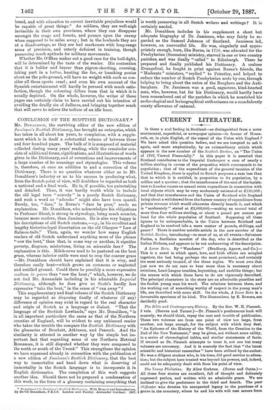CONCLUSION OF THE SCOTTISH DICTIONARY.* MR. DONALDSON, the surviving editor
of the new edition of Jamieeon's Scottish Dictionary, has brought an enterprise, which has taken in all about ten years, to completion, with a supple- ment which is in itself a substantial volume of between three and four hundred pages. The bulk of it is composed of material collected during many years' reading, while the remainder con- sists of additional forms, significations, and illustrations of words given in the Dictionary, and of corrections and improvements of a large number of its meanings and etymologies. This volume is, therefore, at once all addition to and a correction of the Dictionary. There is no question whatever either as to Mr. Donaldson's industry or as to his success in producing what, from the Scotch point of view, will doubtless be regarded as both a national and a final work. He is, if possible, too painstaking and detailed. Thus, it was hardly worth while to include the old legal term " corrody " in a purely Scotch dictionary, and such a word as " adzooks " might also have been spared. Surely, too, "dare," in Burns's "dare be poor," needs no explanation. Mr. Donaldson, who acknowledges his obligations to Professor Skold, is strong in etymology, being much sounder, because more modern, than Jamieson. Be is also very happy in his descriptions of old Scotch customs,—e.g., in his excellent and lengthy historico-legal dissertation on the old Glasgow "Law of Salmon-tails." Then, again, we wonder how many English readers of old Scotch understand anything more of the phrase "cow the bent," than that, in some way or another, it signifies poverty, disgrace, misfortune, living on miserable fare ? The explanation is this. Milch-cows used to be pastured on the best grass, whereas inferior cattle were sent to crop the coarser grass —Mr. Donaldson should have explained that it is wiry, and therefore easily bent—which grows on commons or neglected and unfilled ground. Could there be possibly a more expressive enultam in parvo than "cow the bent ;" which, however, we do not find Mr. Annandale inclading in his admirable Imperial Dictionary, although he does give us Scott's hardly less expressive "take the bent," in the sense of "run away " ?
This supplementary and final volume of the Scotch Dictionary may be regarded as disposing finally of whatever (if any) difference of opinion may exist in regard to the real character and origin of Scotch as a language or dialect. "That the language of the Scottish Lowlands," says Mr. Donaldson, " is in all important particulars the same as that of the Northern counties of England, will be evident to any unbiassed reader who takes the trouble the compare the Scottish Dictionary with the glossaries of Brockett, Atkinson, and Peacock. And the similarity is attested in another way by the simple but im- portant fact that regarding some of our Northern Metrical Romances, it is still disputed whether they were composed to the north or south of the Tweed." This strengthens the opinion we have expressed already in connection with the publication of a new edition of Jamieson's Scottish Dictionary, that the best way to immortalise and hand down what is deserving of immortality in the Scotch language is to incorporate it in English dictionaries. The completion of this work suggests another idea. Should there not be prepared a condensation of this work, in the form of a glossary containing everything that • Supplement to Jamieson', Scottish Dictionary. With Memoir end Introduction. By David Donaldson, F.E.I.S. London and Flunky: Alexander Gardner. 1887.
is worth preserving in all Scotch writers and writings ? It is certainly needed.
Mr. Donaldson includes in his supplement a short but adequate biography of Dr. Jamieson, who may fairly be re- garded as the Samuel Johnson of Scotland. Jamieson led, however, an uneventful life. He was, singularly and appro- priately enough, born, like Burns, in 1759, was educated for the Presbyterian (Secession) ministry, starved in one or two country parishes, and was finally "called" to Edinburgh. There he prepared and finally published his Dictionary. A zealous Evangelical, he fought in print against Burns's friends, the "Moderate" ministers, " replied " to Priestley, and helped to reduce the number of Scotch Presbyterian sects by one, through helping to bring about the union of the Burghers and the Anti- burghers. Dr. Jamieson was a good, sagacious, kind-hearted man, who, however, but for his Dictionary, would hardly have been remembered out of the parishes in which he nourished his archeological and lexicographical enthusiasms on a scandalously scanty allowance of oatmeal.


































 Previous page
Previous page